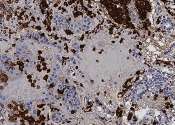Fighting COVID-19 with a cancer drug: A new approach to preventing irreversible organ damage in infectious diseases
Twelve years ago, cancer researchers at University of California San Diego identified a molecule that helps cancer cells survive by shuttling damaging inflammatory cells into tumor tissue. In new research, they show that ...
Jul 3, 2024
0
5









